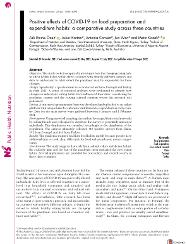| dc.contributor.author | ozen, Asli Emine | |
| dc.contributor.author | Kartari, Asker | |
| dc.contributor.author | Correia, Antonia | |
| dc.contributor.author | Wen, Jun | |
| dc.contributor.author | Kozak, Metin | |
| dc.date.accessioned | 2023-10-19T15:11:35Z | |
| dc.date.available | 2023-10-19T15:11:35Z | |
| dc.date.issued | 2022 | |
| dc.identifier.issn | 1368-9800 | |
| dc.identifier.issn | 1475-2727 | |
| dc.identifier.uri | https://doi.org/10.1017/S1368980022001720 | |
| dc.identifier.uri | https://hdl.handle.net/20.500.12469/5107 | |
| dc.description.abstract | Objective: This study seeks to empirically investigate how the changing eating habits affect health habits within three countries with entirely different cultures and diets to understand to what extent the pandemic may be responsible for these changes. Design: Specifically, a questionnaire was conducted in China, Portugal and Turkey in early 2021. A series of statistical analyses were performed to identify how changes in individuals' eating habits have influenced their diets, considering the pandemic context and the varying cultural contexts where this research was performed. Setting: A structured questionnaire form was developed and uploaded to an online platform with unique links for automatic distribution to respondents in each country. Data for the main survey were gathered between 3 January and 1 February 2021. Participants: Using snowball sampling, the authors leveraged their social networks by asking friends and colleagues to distribute the survey to potentially interested individuals. This distribution was stratified accordingly to the distribution of the population. The authors ultimately collected 319 useable surveys from China, 351 from Portugal and 449 from Turkey. Results: The pandemic inspired healthier food habits, mostly because people have additional time to cook, shop differently for food and spend more money on groceries. Conclusions: The study suggests that aside from cultural values and dietary habits, the available time and the fear of the pandemic most explained the new eating habits. Several implications are provided for researchers and overall society in these three countries. | en_US |
| dc.language.iso | eng | en_US |
| dc.publisher | Cambridge Univ Press | en_US |
| dc.relation.ispartof | Public Health Nutrition | en_US |
| dc.rights | info:eu-repo/semantics/openAccess | en_US |
| dc.subject | Others | En_Us |
| dc.subject | Food preparation | en_US |
| dc.subject | Food expenditure | en_US |
| dc.subject | Cross-cultural research | en_US |
| dc.subject | China | en_US |
| dc.subject | Portugal | en_US |
| dc.subject | Turkey | en_US |
| dc.title | Positive effects of COVID-19 on food preparation and expenditure habits: a comparative study across three countries | en_US |
| dc.type | article | en_US |
| dc.identifier.startpage | 3054 | en_US |
| dc.identifier.endpage | 3066 | en_US |
| dc.authorid | Kartari, Asker/0000-0002-1474-6730 | |
| dc.authorid | OZEN, ASLI EMINE/0000-0002-9052-8559 | |
| dc.authorid | Correia, Antónia/0000-0002-6707-8289 | |
| dc.authorid | Kozak, Metin/0000-0002-9866-7529 | |
| dc.authorid | Wen, Jun/0000-0002-1110-824X | |
| dc.identifier.issue | 11 | en_US |
| dc.identifier.volume | 25 | en_US |
| dc.department | N/A | en_US |
| dc.identifier.wos | WOS:000852053800001 | en_US |
| dc.identifier.doi | 10.1017/S1368980022001720 | en_US |
| dc.identifier.scopus | 2-s2.0-85136854057 | en_US |
| dc.institutionauthor | N/A | |
| dc.relation.publicationcategory | Makale - Uluslararası Hakemli Dergi - Kurum Öğretim Elemanı | en_US |
| dc.authorwosid | Kartari, Asker/ABF-6598-2021 | |
| dc.authorwosid | OZEN, ASLI EMINE/P-1956-2014 | |
| dc.authorwosid | Correia, Antónia/A-5353-2010 | |
| dc.authorwosid | Kozak, Metin/H-8361-2019 | |
| dc.authorwosid | Wen, Jun/AAC-3537-2019 | |
| dc.identifier.pmid | 35983728 | en_US |
| dc.khas | 20231019-WoS | en_US |
















